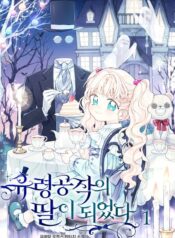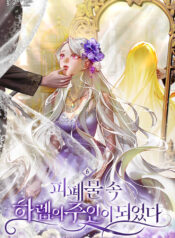‘Mu, we need to leave now.’
‘What are you talking about? It’s still night.’
‘You can’t go with the adopters. Bad adults are going to take you.’
‘That’s impossible! Mrs. Mayhem adores me! She gave me new clothes and a doll. You’re just jealous that I got these gifts, aren’t you? That’s why you’re trying to stop me from being adopted!’
‘No! I overheard it while cleaning the director’s office window. I don’t understand everything, but the director talked about selling you to Mr. Mayhem.’
‘Stop lying! Do you think I’d believe that?’
‘Please, I swear I would never do anything to harm you. I’m worried about you.’
‘I don’t need your concern! I’m going to sleep, so run away by yourself if you want!’
Jacqueline tried to convince Muriel, but Muriel, already excited about her adoption, didn’t believe her. Exhausted by her friend’s stubbornness, Jacqueline began to doubt whether she had heard the conversation correctly.
At the moment of choice, Jacqueline prioritized her own safety over Muriel’s for the first time. It was a natural decision since she was the only girl Muriel’s age who could be sent to that creepy man named Linton the director had mentioned.
Eventually, Jacqueline escaped the orphanage alone.
Jacqueline reunited with Muriel four years later, when she was fourteen. While returning home from factory work, Jacqueline was shocked to see a woman singing and begging on the street.
It was Muriel. Though she looked much more mature, the beautiful girl with light brown hair and dark brown eyes was undoubtedly her friend. Muriel recognized Jacqueline immediately too.
Jacqueline took Muriel, who had nowhere to go, to her current home, and they lived together from then on. Until Muriel left home again.
“Sigh…”
Standing in front of the orphanage, Jacqueline felt like she had returned to being a ten-year-old girl, just like when she first left.
A caretaker who had been watching the woman sighing in front of the main gate approached her.
“Who might you be?”
“Ah. I’m from this place…”
“You’re from Everett Orphanage? Oh dear. Everett Orphanage closed down quite a while ago.”
“What? That can’t be! Look, I can see children playing over there.”
Jacqueline pointed to children playing in the front yard.
“Oh my, getting old makes my memory slip when I turn around. I didn’t explain properly. This is a public orphanage run by the government. Tsk, tsk, I told them we should replace the sign.”
“No, how did this happen? I mean, when did it change?”
“Around the end of the war, so about two years ago? The director couple was reported. They were caught embezzling government funds in collusion with an accountant and were severely punished. All sorts of corruption came to light, and now they’re both in prison. Considering what they did, it’s a lenient treatment.”
Jacqueline couldn’t believe the director couple was in prison. She had worried about running into them on her way to the orphanage, but that concern now seemed pointless. Looking at the children playing freely, she hoped the director couple would suffer even more in prison.
“Come to think of it, you said you’re from Everett Orphanage? Then you must have been here when the director couple was around, so you must have had a hard time. Oh, I’m late with my introduction. I’m Doyle Kiuman. I work as a caretaker at the Carlson house but occasionally come here to repair the facilities.”
“I’m Jacqueline Carroll.”
“So, what brings you here?”
“I came because of a deceased friend… I was wondering if any of the old records might still exist.”
Doyle Kiuman thought for a moment, then nodded with sudden realization.
“Now that you mention it, they probably kept the orphanage name because people like you come looking for it from time to time. Miss Sheila would know better about orphanage matters, so you should ask her. It’s almost lunchtime, so she’s probably in the dining hall.”
“Dining hall? Not the ration center?”
“You’ll be surprised. It’s changed a lot since your time.”
During wartime, everything was rationed, so even the dining room was called the ration center.
Back then, the orphanage operated on relief supplies from the government or private sectors, but even that was reduced for the children because the director couple diverted the funds.
Jacqueline followed Doyle Kiuman to the dining hall. On the way, she noticed scenery both familiar and strange.
The water tap where they had washed clothes with bare hands in the cold winter was gone, replaced by a rest area. A yellow-roofed pavilion with tables and chairs stood there.
Jacqueline stared in wonder at the children sitting in chairs and freely drawing pictures. When Doyle Kiuman urged her on, she snapped back to attention and hurried along.
Then she was surprised again to see a lush beech tree standing in the middle of the garden. The swing where she and Muriel had taken turns pushing each other was still there.
“That tree is still the same.”
“There were opinions to cut it down, but graduates of this place insisted that the tree must remain.”
“I understand why they said it shouldn’t be cut down.”
The only good memories she had from the orphanage were those associated with that tree.
Memories of playing tag with other children by circling around the trunk, or climbing up the branches to feel the breeze and watch the colorful sunset—these memories came back to her, faint yet vivid.
Upon reaching the dining hall, Doyle Kiuman called out to Sheila, who was busy preparing lunch. Jacqueline quickly introduced herself.
“I’m Jacqueline Carroll. I was a resident at Everett Orphanage.”
“Nice to meet you, Miss Carroll. I’m Sheila Delgado.”
“I want to know if my friend visited this place. She recently passed away and left only a note with this address…”
“I see. Do you have the note with you? May I see it?”
When Jacqueline handed over the note, Sheila Delgado’s face hardened after examining it. Jacqueline tensed up seeing Sheila Delgado’s serious demeanor. She resented the deceased Muriel, thinking it was always like this with her.
‘Muriel, what trouble did you cause this time?’
Sheila Delgado sighed and said: “I’m sorry.”
“No, it’s fine. Judging by your expression, my friend must have committed some serious offense here.”
“Not exactly an offense. Miss Carroll, did you really come here without knowing?”
“Yes. I just came after reading the note my friend left me.”
“Oh dear.”
“It’s okay, please tell me.”
“Actually…”
Sheila Delgado shared shocking news with Jacqueline.
It felt exactly like watching Pandora’s box open and being unable to stop the overwhelming truth from pouring out.
Sheila Delgado explained what had happened.
“It was during the hazelnut harvest season, so about a month ago. She looked like she had been through a lot on the road, but her face was so pretty that I still remember it. She said her name was Ruby Munro, was it? I immediately noticed that name was an alias.”
Jacqueline had already heard the name Ruby Munro at the convent.
‘Was that Muriel’s stage name when she was a canary? No wonder it was hard to find her. Why didn’t I think of stage names? Should I have gone to a detective agency like my uncle advised? Could I have seen her face before she died if I had?’
While mourning Muriel’s fall, Jacqueline couldn’t understand why Muriel hadn’t come to find her. Her resentment deepened.
“The skinny woman with a protruding belly said she had been wandering the streets for a long time. Expectant mothers who come to the orphanage usually give fake names, so I let it slide. I took her in even knowing she would leave right after giving birth because she had nowhere else to go.”
Completely unprepared for this revelation, Jacqueline covered her mouth in disbelief. Sheila Delgado gave her a bitter look.
“The baby was born two weeks ago. When I asked her to at least name the child, she said someone else would come to name it. I wondered who that might be… and it turns out to be you, her friend.”
“I, I really didn’t know. I mean, I didn’t come here with that intention…”
“I won’t ask you to take responsibility, but please at least give the child a name.”
The moment Sheila Delgado saw the clueless Jacqueline, she expected nothing. She had thought the same when she first saw that small red face covered in placental residue.
If lucky, the child’s biological father or a close relative would take it, otherwise it would grow up here, feeding on the small memories left by its mother.
Since babies born in orphanages usually met similar fates, Sheila Delgado waited for the woman before her to name the baby.
In truth, she didn’t have to name it. If the woman left without giving a name, the name Sheila arbitrarily chose would become the child’s name. She would only regret losing a story that could comfort the child growing up here when times got tough.
After thinking for a while, Jacqueline finally spoke.
“May I see the child?”
The baby was a boy. A healthy child who ate well, slept well, and cried well. Jacqueline examined the baby in Sheila Delgado’s arms carefully.
The round forehead and cute little nose resembled Muriel, while the eyes and ear shape seemed foreign, probably taking after the biological father.
Sheila Delgado cautiously asked:
“Would you like to hold him?”
“Is that okay?”
“You’ve washed your hands and are wearing an apron, so it should be fine. Oh, you don’t have a cold, do you?”
“No.”
“Then you may hold him.”
Jacqueline took the baby from Sheila Delgado. The tightly swaddled baby was so small that he seemed like he might disappear in her arms.
Though in unfamiliar arms, he didn’t fuss and remained calm. Muriel’s baby occasionally caught Jacqueline’s attention with physiological responses like wrinkling his nose or moving his lips.






